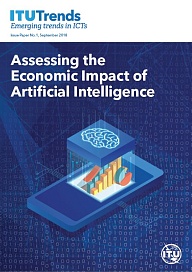This publication by The International Telecommunication Union (ITU), contributed by the McKinsey Global Institute (MGI), the economic and business research arm of McKinsey & Company, offers a framework for thinking about how to model the economic impact of AI. The modeling is done in the context of the research on the dynamically changing world of work in the light of automation, the need for a skills revolution, and the increasing and potential use of AI by companies. The research examined seven possible channels for AI impact: augmentation; substitution; product and service innovation and extension; economic gains from increased global flows; wealth creation and reinvestment; transition and implementation costs; negative externalities.
.png)
This research should help to broaden collective understanding of how AI may impact economic activity, and potentially touch off a competitive race with implications for firms, labor markets, and economies.
This paper focuses on five broad categories of AI technologies: computer vision, natural language, virtual assistants, robotic process automation, and advanced machine learning. Companies will likely use these tools to varying degrees. Some will test only one technology, piloting it in a specific function. Others may adopt all five.
AI has large potential to contribute to global economic activity. The pattern of adoption and full absorption may be relatively rapid. By 2030, AI will deliver about 1.2 percent additional GDP growth per year more than that of other general-purpose technologies through history. However, the economic impact of AI may emerge gradually and be visible only over time, but it may build up at an accelerating pace over time. It is likely to demonstrate a slow start due to substantial costs and investment associated with learning and deploying these technologies, but then an acceleration driven by the cumulative effect of competition and an improvement in complementary capabilities.
AI could deliver a boost to economic activity, but the distribution of benefits is likely to be uneven. AI may widen gaps between countries, reinforcing the current digital divide. At company level, AI technologies could lead to a performance gap between front-runners on one side and slow adopters and non-adopters on the other. A widening gap may also unfold at the level of individual workers. Demand for jobs could shift away from repetitive tasks toward those that are socially and cognitively driven and others that involve activities that are hard to automate and require more digital skills.
.png)
In other words, if the development and deployment of these technologies are not handled effectively, inequality could deepen, fueling possible conflicts within societies. To avoid this, governments and firms should partner to support individuals in their transition from obsolete to new jobs, while workers will need to develop and refresh their skills to meet the requirements of the dynamic labor market.






